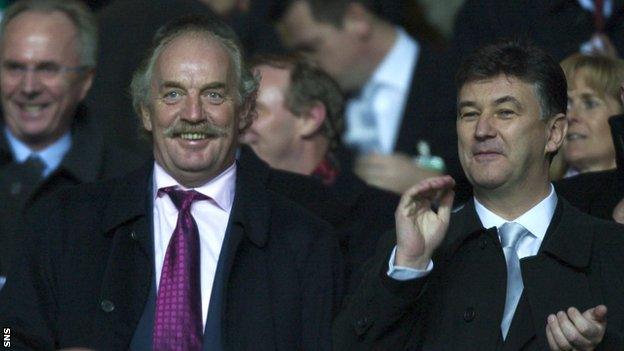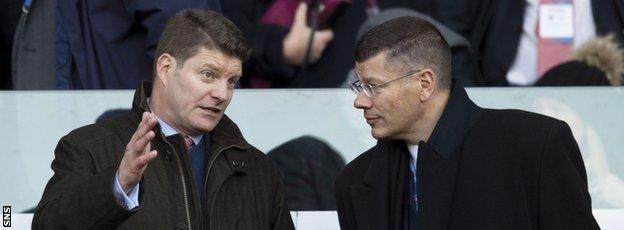Peter Lawwell: Changing of Celtic guard offers different landscape for Dominic McKay
- Published

Peter Lawwell in 2003 with majority shareholder Dermot Desmond
When Peter Lawwell assumed high office at Celtic Park more than 17 years ago, the place was rock solid from top to toe, a team that was good enough to go all the way to the Uefa Cup final only a few months before, beating Liverpool along the way and only losing in extra time to Jose Mourinho's Porto, who would soon become Champions League winners.
Lawwell had the wisdom of Martin O'Neill in the manager's chair, the genius of Henrik Larsson as the totem of a side that had strong characters and proven leaders throughout. In his first campaign in the job, Celtic won the league by 17 points, beat Rangers five times in a row, beat Barcelona in Europe and won the Scottish Cup. Lawwell wouldn't have had his feet up on the desk and a cigar in his mouth while all this was happening, but the role was easier then. So much easier than it is now.
This is not how Lawwell would have imagined the great handover. In his dreams he would have been thinking of leaving in a blaze of 10-in-a-row glory, a rapturous farewell from a packed Celtic Park on the final day of the season, a raft of media interviews poring over the great players he signed, the great titles he won and what it all meant for his legacy. Instead, he's leaving in silence. No on-pitch goodbye, no opportunity to bask in his many achievements.
He would also have been planning a smoother transition, just like he had way back when. Instead, the new man, Dominic McKay, is inheriting a heap of problems. Lawwell had a stellar team when he started, McKay will not. Lawwell had a side ready to rout Rangers, McKay is looking at a rebuild. Lawwell had a vastly experienced and hugely successful manager in O'Neill, McKay doesn't have that either. Nobody knows who will be the Celtic manager next season.
Lawwell also had a contented support. McKay is going into a job where many fans feel disaffected and ignored. They don't just feel let down by the poor performances of their team on the pitch, they feel taken for granted. So apart from finding a new manager, creating a new team and winning over an angry support, McKay doesn't have a lot in his in-tray.
'Celtic's 10-in-a-row vision blurred sight of Euro progress'
When the news came through on Friday morning that Lawwell was leaving, it didn't really come as a surprise. It's been mooted for a long time. Seventeen years at the helm of a club like Celtic is an outrageously good innings. The fact that much of it was successful is a credit to the job Lawwell did. Doubles, trebles, quadruples. Unheralded players brought in for a song and sold for a fortune. European nights that will live forever in the folklore of the club. Shunsuke Nakamura against Manchester United, Scott McDonald against AC Milan, Tony Watt against Barcelona, Olivier Ntcham against Lazio.
He could have done more, of course he could. In recent times, Celtic's obsession with achieving the blessed 10 blurred whatever vision they might have had in becoming more of a relevance in Europe in the eyes of their disgruntled supporters. Their domestic dominance grew as their results in the Champions League and Europa League fell. Where before in the Lawwell years they were competing with and occasionally beating the biggest guns, they're now losing to clubs with smaller budgets than their own.
For a club that revels in its own European story, they lost their way in recent times. "The 10" became a Holy Grail wrapped in kryptonite. With the money they've earned through terrific transfer business and multiple helpings of Champion League lucre, you feel that they should be way further ahead than they are in European terms. Any fair assessment of Lawwell's era as a whole would have to conclude that he was a significant success, but it could have been more.
Lawwell has not only driven Celtic these past 17 years, he's also been the most powerful man in the Scottish game for much of it, certainly in the last decade. Lawwell was never one to shout from centre stage. He much preferred to pull strings from the wings. He had a hawk-like vision for football politics and a chess player's capacity to be three or four moves ahead. Until some may say he lost his touch this season - the Dubai farce being the latest manifestation of how his decision-making had gone awry.
It was Lawwell's influence that helped put Ian Maxwell in his role as as chief executive of the Scottish FA and it's been Lawwell's support that's helped Neil Doncaster in his role as chief executive of the SPFL.
'McKay must steel himself for what lies ahead'
Unquestionably, the end could have been tidier. He would have wanted to leave behind a well-oiled winning machine with an imperious squad and a settled management team in place. Instead, McKay has a world of issues to solve and no experience of solving them, or anything like them.
McKay is a Celtic supporter, but he's never worked in football before. He comes from the relatively genteel world of professional rugby and is now about to enter a different planet. He's a good communicator, strong on sports politics and relationship-building and has been influential in dealings with government and private equity firms as Scottish Rugby attempted to boost its income through the years.
McKay is what you might call an operator in that environment. Whereas football thought it a good idea to harangue government in public for a perceived lack of support during the pandemic, McKay was altogether more circumspect. There were no histrionics, no private briefings to journalists, no attempt to pressure government into giving rugby much-needed money.

Dominic McKay pictured with SPFL chief executive Neil Doncaster
His diplomacy has been one of his stronger suits when talking to civil servants, corporate leaders or governing bodies. From a communications role at Murrayfield he's turned himself into the chief executive of Celtic.
Professional football is not rugby, though. It's hard-bitten and brutal and nowhere is it more barmy and more unforgiving than at Celtic and Rangers. Lawwell was as tough as old boots, a plotter and gladiator in one. He revelled in the battle with other clubs, with agents, with players, with journalists.
McKay has never lived that life, has never had the pressure of a support bearing down on him, has never existed in a such a wildly emotional landscape. Rugby is a picnic in comparison. Win, lose or draw you don't have fans outside Murrayfield calling for your head. It's a far more understanding place.
Being a Celtic supporter, he'll know that, but knowing it and living it are two different things. However thick McKay thinks his skin is, he'd be advised to steel himself. Nothing he has done before will have prepared him for his new world.
